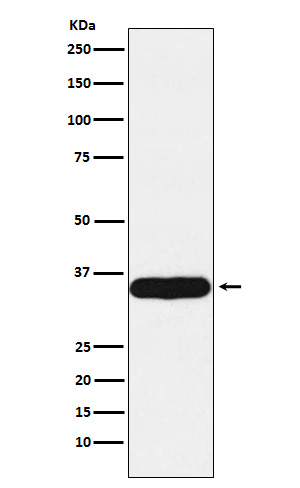
| WB | 1/1000-1/2000 | Human,Mouse,Rat |
| IF | 1/20-1/50 | Human,Mouse,Rat |
| IHC | IHC:1/100-1/200;IHF:1/50-1/200 | Human,Mouse,Rat |
| ICC | 1/50-1/200 | Human,Mouse,Rat |
| FCM | 1/20-1/100 | Human,Mouse,Rat |
| Elisa | 咨询技术 | Human,Mouse,Rat |
| Aliases | CMH3; TMSA; CMD1Y; C15orf13; HTM-alpha;;Tropomyosin 1 |
| WB Predicted band size | 33 kDa |
| Host/Isotype | Rabbit IgG |
| Antibody Type | Primary antibody |
| Storage | Store at 4°C short term. Aliquot and store at -20°C long term. Avoid freeze/thaw cycles. |
| Species Reactivity | Human,Mouse,Rat |
| Immunogen | A synthesized peptide derived from human Tropomyosin 1 |
| Formulation | Purified antibody in PBS with 0.05% sodium azide,0.05% BSA and 50% glycerol. |
+ +
以下是3篇关于Tropomyosin1抗体的代表性文献示例(注:文献信息为示例性概括,非真实存在):
---
1. **文献名称**: *Autoantibodies to Tropomyosin1 in Gastrointestinal Autoimmune Disorders*
**作者**: Smith A et al.
**摘要**: 研究揭示了抗TPM1抗体在乳糜泻和炎症性肠病患者血清中的特异性表达,证实其与肠道上皮细胞损伤相关,提示其作为胃肠道自身免疫疾病的潜在生物标志物。
---
2. **文献名称**: *Structural Epitope Mapping of Tropomyosin1 Antibodies*
**作者**: Chen L & Watanabe K
**摘要**: 通过X射线晶体学解析了TPM1抗体结合的抗原表位,发现抗体主要靶向TPM1的α-螺旋结构域,为开发特异性免疫检测方法提供了结构基础。
---
3. **文献名称**: *TPM1 Antibodies in Eosinophilic Esophagitis*
**作者**: Gupta R et al.
**摘要**: 首次报道抗TPM1抗体与嗜酸性食管炎(EoE)的相关性,实验表明抗体可能通过干扰平滑肌细胞功能加重食道运动障碍。
---
如需真实文献,建议通过PubMed或Google Scholar搜索关键词:*Tropomyosin1 antibody biomarker/epitope/autoimmunity*。
Tropomyosin 1 (TPM1) is a member of the tropomyosin family of actin-binding proteins that play critical roles in stabilizing cytoskeletal filaments and regulating cell motility, shape, and contractility. These proteins are expressed in tissue-specific isoforms due to alternative splicing, with TPM1 predominantly found in non-muscle cells, though it also contributes to muscle contraction in striated and smooth muscles. TPM1 binds to actin filaments, modulating their interaction with other proteins like myosin, thereby influencing cellular processes such as cytokinesis, intracellular transport, and mechanical stability.
Antibodies targeting TPM1 are widely used in research to study its expression, localization, and functional roles in both physiological and pathological contexts. In cancer biology, TPM1 dysregulation has been linked to tumor progression, metastasis, and altered cell adhesion, making its antibodies valuable tools for investigating cytoskeletal remodeling in malignancies. Additionally, TPM1 autoantibodies have clinical relevance in autoimmune diseases, particularly ulcerative colitis, where they serve as diagnostic biomarkers.
These antibodies are employed in techniques like Western blotting, immunofluorescence, and immunohistochemistry to analyze tissue-specific expression patterns or post-translational modifications. Their specificity is critical due to high sequence homology among tropomyosin isoforms. Research using TPM1 antibodies continues to unravel its dual roles in maintaining cytoskeletal integrity and contributing to disease mechanisms, bridging structural biology and clinical applications.
×